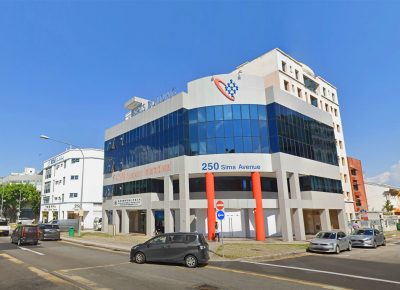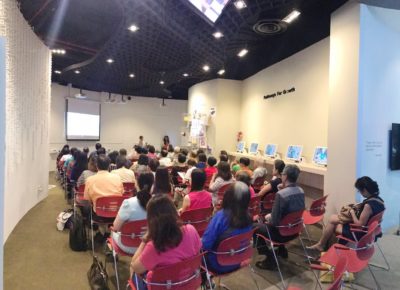Singapore is a cosmopolitan society where people live harmoniously and interaction among different races are commonly seen. The pattern of Singapore stems from the inherent cultural diversity of the island. The immigrants of the past have given the place a mixture of Malay, Chinese, Indian, and European influences, all of which have intermingled.
Behind the facade of a modern city, these ethnic races are still evident. The areas for the different races, which were designated to them by Sir Stamford Raffles, still remain although the bulk of Singaporeans do think of themselves as Singaporeans, regardless of race or culture. Each still bears its own unique character.
The old streets of Chinatown can still be seen; the Muslim characteristics are still conspicuous in Arab Street; and Little India along Serangoon Road still has its distinct ambience. Furthermore, there are marks of the British colonial influence in the Neo-Classical buildings all around the city.
Each racial group has its own distinctive religion and there are colorful festivals of special significance all year round. Although the festivals are special to certain races, it is nonetheless enjoyed by all.
In Singapore, food is also readily and widely available. There are lots of cuisines to offer. We have, Chinese, Indian, Malay, Indonesian and Western, Italian, Peranakan, Spanish, French, Thai and even Fusion. It is very common to savour other culture’s food and some of the food can be very intriguing. Indian foods are relatively spicier, whereas Chinese food is less spicier and the Chinese enjoy seafood. Malay cooking uses coconut milk as their main ingredient that makes their food very tasty.
You can refer to our Eating in Singapore section for a list of recommended food outlets in Singapore.
The four official languages of Singapore are Mandarin, Malay, Tamil and English. English is the most common language used and is the language which unites the different ethnic groups.
Source: Singapore Expats as of 26 August 2015.
http://www.singaporeexpats.com/about-singapore/culture-and-language.htm
Singapore is served by good transportation facilities that are available in practically every part of the Republic.
There is a good network of bus routes connecting to the mass rapid transit (MRT) stations. Those who want to enjoy greater degree of comfort may take to taxis run by several companies; among them are ComfortDelgro, City Cab, Yellow Top and TIBS to name a few. Taxi fare is charged by kilometres of travel. Receipt can also be obtained from the taxis, if requested.
If you plan to travel by public transport buy a $15 EZ-Link card with an encoded $10 value (available from all MRT train stations) allowing for cashless payments. This mode of payment, besides being convenient, is also cheaper than cash payments Students can obtain the BUS/MRT Guide Book at the major book stores for their travel destinations and purchase the EZ Link Card to facilitate payments. This mode of payment is not only convenient but cheaper than cash.
Source: Your Singapore as of 26 August 2015.
http://www.yoursingapore.com/about-singapore/traveller-information/travelling-around-singapore.html
| Description | Monthly Cost (SGD) | Note |
|---|---|---|
| Food | $300 – $400 | Eat at Foodcourt or Hawker Centre. |
| Accommodation | $400 – $700 | Hostel, HDB or condominium. |
| Transport | $100 – $150 | Public transport fares. |
| Communications | $50 – $80 | Includes internet access, mobile phone subscriptions |
| Others | $50 – S$100 | Grocery |
| Estimated Total Monthly Expenses | $900 – $1,430 |
Note: The above costs serve as a guide as expenditures will vary depending on personal spending habits.
- Immigration & Checkpoints Authority of Singapore
(Terms and Conditions of Student’s Pass (STP))
- You are required to produce your STP card and passport to the Immigration Officer at the Checkpoint each time you leave Singapore and return.
- Under regulation 8(5)(e) of the Immigration Regulations made under the Immigration Act (Cap. 133), you are required to surrender the Card when the Student’s Pass issued to you is cancelled or has expired, and when a new Card is issued to you.
- Under regulation 8(5)(f) of the Immigration Regulations, should you intend to leave Singapore and only return after the expiry of the Student’s Pass issued to you, you are required to surrender this Card to the Immigration Officer at the Checkpoint at the time of your departure.
- You should take good care of the Student’s Pass Card and prevent loss through negligence. If the Student’s Pass Card is lost or stolen, you are required to make a police report immediately and report to ICA within 7 days to apply for a replacement Student’s Pass. Issuance and/or replacement fees shall apply. If you recover possession of your lost Student’s Pass Card after reporting such loss to ICA, you are required to surrender the recovered Student’s Pass to ICA for cancellation within 7 days from the date of recovery of the Card.
- Under regulation 8(5)(b), you shall notify ICA if there is any change in your place of residence within 14 days of the change. You shall report a change of address online through your school or local sponsor via e-Update of Address.
- You shall comply with the provisions of the Immigration Act and any regulation made under the Act, or any statutory modification or re-enactment in force in Singapore during your stay.
- You shall not engage in any activity, criminal or otherwise, which is inconsistent with the purpose for which the Student’s Pass has been issued.
- You shall not take part in any political or other related activities during your stay in Singapore.
- You shall not contravene any laws or any statutory modification or re-enactment in force in Singapore during your stay.
- You shall not smoke, administer to yourself, consume or be in any way engaged in the trafficking of any controlled drug as defined in the Misuse of Drug Act or any written law in force relating to the control of dangerous or harmful drugs.
- You shall abide by the conditions specified in regulations 14(1A) of the Immigration Regulations, where applicable. You must not engage in any form of paid employment or in any business, profession or occupation in Singapore during the validity of your Student’s Pass unless you have a valid work pass issued under the Employment of Foreign Manpower Act (Cap. 91A).
- You understand that if the Controller of Immigration is satisfied that you or any member of your family breaches the Terms & Conditions mentioned above, or becomes an undesirable or prohibited immigrant, he will cancel your Student’s pass and the immigration passes of the members of your family, and you may be required to leave Singapore within 24 hours of such cancellation.
- You are required to attend class regularly, must maintain an overall attendance of 90% and above every month. If you fail to attend classes for a continuous period of 7 days your Student’s Pass is liable to be cancelled with effect from the 8th day. The letter of cancellation will be sent to your place of residence as registered with ICA. Remaining in Singapore unlawfully after the cancellation of your Student’s Pass is an offence under Section 15 of the Immigration Act and you would be liable for prosecution.
- You understand that your Student’s Pass will be cancelled by the Controller of Immigration if you fail to remain or cease to be retained as a student in your educational institution.
- This Student’s Pass is issued to you on the condition that the Terms & Conditions mentioned above are complied with. Under regulation 40(2) of the Immigration Regulations, any person who without reasonable cause contravenes or fails to comply with any condition imposed in respect of or any direction endorsed on any pass or permit shall be guilty of an offence and shall be liable on conviction to a fine not exceeding $1,000 or to imprisonment for a term not exceeding 6 months or to both.
- Dual-Channel System
(Customs Clearance)
The Dual-Channel system (or Red and Green Channels system) enables the quick clearance of travellers at entry checkpoints - About Ministry of Law, Singapore
Link: https://www.mlaw.gov.sg
Singapore’s healthcare system has gained an international repute of impeccable standards, with state-of-the-art medical facilities.
It is also readily accessible and affordable, thanks to a well-planned and integrated healthcare structure. More than 400,000 people come to Singapore each year for medical treatment.
Singapore’s healthcare system is renowned for its excellent clinical quality with outcomes comparable to leading healthcare institutions in the developed countries. Its healthcare institutions have established strong partnerships with top medical centres around the world and its doctors and surgeons have accomplished many firsts in the area of medical research.
Hospital Services
Public Hospitals in Singapore
There are seven public hospitals in Singapore comprising five general hospitals, a women’s and children’s hospital and a psychiatric hospital. Non-Singapore Citizens and Permanent Residents may only stay in the A-class (1 or 2 beds per room) and B1-class (4 beds) wards. The Ministry of Health provides a list of complete charges including doctors’ fees for a comprehensive range of procedures at public hospitals http://www.moh.gov.sg.
Six national specialty centres provide specialist services for cancer, cardiac, eye, skin, neuroscience and dental care.

MORE INFORMATION
DISCOVER A BETTER YOU.
Take a leap into one of the most rewarding industries and help change people’s lives. Begin your journey today by applying to any of our world-class courses!








































